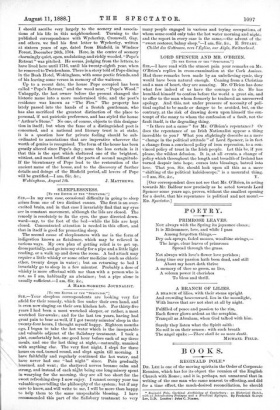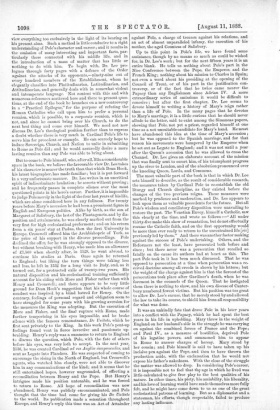BOOKS.
REGINALD POLE.*
DR. LEE is one of the moving spirits in the Order of Corporate Reunion, which has for its object the reunion of the English Church with Rome ; and it is, perhaps, not unnatural that in writing of the one man who came nearest to effecting, and did for a time effect, the much-desired reconciliation, he should • Reginald Pole, Cardinal Archbishop of Canterbury : an Historical &etch, with an Introductory Prologue and a Practical Epilogue. By Frederick Gtorge Lee, A.D. London ; John C. blimino. view everything too exclusively in the light of its bearing on his present aims. Such a method is little conducive to a right understanding of Pole's character and career; and it results in the omission of many interesting and important facts, par- ticularly those connected with his middle life, and in the introduction of a mass of matter that has little or nothing to do with him. To begin with, Dr. Lee pro- logues through forty pages with a defence of the Order against the attacks of its opponents,—ninety-nine out of every hundred members of the Establishment, whom he elegantly classifies into Platitudinarian, Latitudinarian, and Attitudinarian, and generally deals with in somewhat violent and intemperate language. -Not content with this and with numerous references scattered here and there to present ques- tions, at the end of the book he launches on a new controversy in a " Practical Epilogue," for the purpose of refuting the Roman Catholics who call upon him to prefer a personal reunion, which is possible, to a corporate reunion, which is not, and since he cannot bring over his Church, to do the next best thing and come over himself. We need not now discuss Dr. Lee's theological position further than to express a doubt whether there is very much in Cardinal Pole's life to serve him for precedent or example. He can scarcely hope to induce Sovereign, Church, and Nation to unite in submitting to Rome as Pole did ; and he would assuredly desire a more lasting reunion than any Pole was able to bring about.
But to come to Pole himself, who, after all, fills a considerable space in the book, we believe the favourable view Dr. Lee takes of his character is nearer the truth than that which Dean Hook, his latest biographer, has made familiar; but it is put forward in a very unfortunate manner. Dr. Lee writes in an uncritical spirit of indiscriminate laudation ; he asserts without proving ; and he frequently passes in complete silence over the most questioned points in his hero's career. Further, it is impossible to judge Pole merely in the light of the four last years of his life, which are alone considered here in any fullness. For twenty years before Mary's accession he had been a prominent figure in English and European politics. Alike by birth, as the son of Margaret of Salisbury, the last of the Plantagenets, and by dis- position and attainments, he was clearly marked out from the very first for high ecclesiastical preferment; and on his return from a six years' stay at Padua, then the first University in Europe, Cromwell offered him the Archbishopric of York, as the price of his support in the divorce proceedings. Pole declined the offer, for he was strongly opposed to the divorce, but without breaking with Henry, who made him an allowance of 21,500 when shortly after, in 1529, he went abroad, to continue his studies at Paris. Once again he returned to England ; but liking the turn things were taking less and less, he left in 1532 for a long visit to Italy, and, as it turned out, for a protracted exile of twenty-two years. His natural disposition and his ecclesiastical training sufficiently account for his siding with More and Fisher rather than with Henry and Cromwell ; and there appears to he very little ground for Dean Hook's suggestion that his whole course of conduct was inspired by a blind hatred for Henry. On the contrary, feelings of personal regard and obligation seem to have struggled for some years with his growing aversion for the measures the King was adopting. But the execution of More and Fisher, and the final rupture with Rome, made further temporising in his eyes impossible, and he broke silence with the famous remonstrance, De Unitate, which he first sent privately to the King. In this work Pole's pent-up feelings found vent in fierce invective and passionate up- braiding. Henry's reply was a summons to return to England to discuss the question, which Pole, with the• fate of others before his eyes, was very loth to accept. In the next year, 1536, he was created Cardinal ad res Angliie iontpanentlas, and sent as Legate into Flanders. He was suspected of coming to encourage the rising in the North of England, but Cromwell's agents, who watched him closely, were not able to discover him in any communications of the kind; and it seems that he still entertained hopes, however ungrounded, of effecting a reconciliation between Henry and the Pope. But Henry's intrigues made his position untenable, and he was forced to return to Rome. All hope of reconciliation was now abandoned, Henry was publicly excommunicated, and Pole thought that the time had come for giving his De Unitate to the world. Its publication made a sensation throughout Europe, and Henry's reply this time was an Act of Attainder
against Pole, a charge of treason against his relations, and an act of almost unparalleled infamy, the execution of his mother, the aged Countess of Salisbury.
Up to this point in Pole's life, we have found some assistance, though by no means so much as could be wished for, in Dr. Lee's work ; but for the next fifteen years it is an entire blank He tells us nothing about Pole's part in the Nice Conference between the Pope, the Emperor, and the French King ; nothing about his mission to Charles in Spain; not even a word about his presiding at the opening of the Council of Trent, or of his part in the justification con- troversy, or of the fact that he twice came nearer the Papacy than any Englishman since Adrian IV. A more extraordinary series of omissions it would be difficult to conceive ; but after the first chapter, Dr. Lee seems to devote himself to writing a history of Mary's reign rather than a life of Pole. In the many pages that he devotes to Mary's marriage, it is a little curious that he should never allude to the letter, said to exist among the Simancas papers, showing that Pole, not yet a priest, regarded himself at one time as a not unsuitable candidate for Mary's hand. He must have abandoned this idea at the time of Mary's accession ; but he was opposed to the Spanish marriage, and for that reason his movements were hampered by the Emperor when he set out as Legate to England; and it was not until a year after the Queen's accession that he was allowed to cross the Channel. Dr. Lee gives an elaborate account of the mission that was finally sent to escort him, of his triumphant progress up the river to London, and of the absolution pronounced over the kneeling Queen, Lords, and Commons.
The most valuable part of the book is that in which Dr. Lee sets himself to describe, as the result of considerable research, the measures taken by Cardinal Pole to re-establish the old liturgy and Church discipline, as they existed before the changes of the two previous reigns. These measures were marked by prudence and moderation, and Dr. Lee appears to look upon them as valuable precedents for the future. But all Pole's wisdom and conciliatory disposition were unavailing to restore the past. The Venetian Envoy, himself a Catholic, saw this clearly at the time, and wrote as follows :—" All under thirty-five make this show of recantation, but do not effectually resume the Catholic faith, and on the first opportunity would be more than ever ready to return to the unrestrained life [sic] previously led by them." And there was another factor making against the success of Pole's undertaking. Others, and the Reformers not the least, have persecuted both before and since ; but there never was a persecution that recoiled so fatally on the cause its authors had at heart as this. The part Pole took in it has been much discussed. That he was opposed to persecution at a time when persecution was a re- ceived doctrine among all creeds is shown by his letters; but the weight of the charge against him is that the fiercest of the persecutions took place after Gardiner's death, when he was foremost in the counsels of the Queen. That he instigated them there is nothing to show, and his own diocese of Canter- bury numbered fewest victims. But his position was too great to allow Dr. Lee's excuse, that he merely stood by and allowed the law to take its course, to shield him from all responsibility for what was done.
It was-an unkindly fate that drove Pole in his later years into a conflict with the Papacy, which he had spent the best years in his life in upholding. Mary threw in the weight of England on her husband's aide in the struggle he was carrying on against the combined forces of France and the Pope ; and Paul IV., as a measure of hostilities, deprived Pole of his legatine powers, and summoned him to appear in Rome to answer charges of heresy. Mary stood by her cousin ; and Pole himself is said to have taken up his incisive pen against the Pope, and then to have thrown the production aside, with the exclamation that he would not expose his father's nakedness. With the close of the struggle the matter was allowed to drop. In considering Pole's career, it is impossible not to feel that the age in which he lived was little calculated to give free play to the beat qualities of his nature. In other times, his piety, his amiability, his liberality, and his love of learning would have made themselves more fully felt, and he might have come down to us as one of the great ecclesiastical patrons of learning. But as a diplomatist and a statesman, his efforts, though respectable, failed to produce any lasting influence.



































 Previous page
Previous page